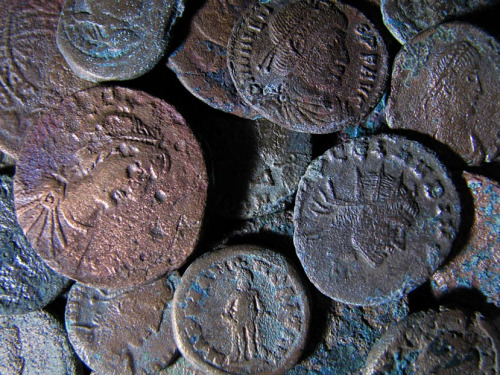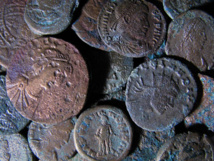A farmer had made the spectacular discovery back in July, when he spotted a molehill with some shimmering green coins.
A few months earlier, remains of an early Roman settlement were discovered in a dig in the nearby town of Frick, so the farmer suspected he may have found Roman coins.
He contacted the regional archeological service and his suspicions were confirmed.
The service announced Thursday that after months of discreet excavations, a total of 4,166 coins had been found in excellent condition.
Their imprints remain legible, allowing an expert to determine they date back to Ancient Rome, stretching from the rein of Emperor Aurelian (year 270-275) to that of Maximilian (286-305), with the most recent coins dated to year 294.
"The orchard where the coins were found was never built on. It is land that has always been farmed," archeologist Georg Matter told AFP, explaining how the treasure could have laid dormant for so long.
The coins' excellent condition indicates that their owner systematically stashed them away shortly after they were made, the archeologists said.
For some reason, the owner had buried them shortly after 294 and never retrieved them, the archeologists said.
Some of the coins, made mainly of bronze but with an unusually high silver content of five percent, were buried in small leather pouches.
The archeologists said it was impossible to determine their original value due to rampant inflation at the time, but said they clearly must have been worth at least a year or two of wages.
How much the coins are worth today is beside the point, Matter said, pointing out that the farmer would not be allowed to keep his treasure.
"He will likely get a finders fee," he said, "but the objects found belong to the public, in accordance with Swiss law."
The Ueken treasure is set to go on display at the Vindonissa de Brugg Museum in Aargau.
-----------------------------------------------------------------------------------------------------
A few months earlier, remains of an early Roman settlement were discovered in a dig in the nearby town of Frick, so the farmer suspected he may have found Roman coins.
He contacted the regional archeological service and his suspicions were confirmed.
The service announced Thursday that after months of discreet excavations, a total of 4,166 coins had been found in excellent condition.
Their imprints remain legible, allowing an expert to determine they date back to Ancient Rome, stretching from the rein of Emperor Aurelian (year 270-275) to that of Maximilian (286-305), with the most recent coins dated to year 294.
"The orchard where the coins were found was never built on. It is land that has always been farmed," archeologist Georg Matter told AFP, explaining how the treasure could have laid dormant for so long.
The coins' excellent condition indicates that their owner systematically stashed them away shortly after they were made, the archeologists said.
For some reason, the owner had buried them shortly after 294 and never retrieved them, the archeologists said.
Some of the coins, made mainly of bronze but with an unusually high silver content of five percent, were buried in small leather pouches.
The archeologists said it was impossible to determine their original value due to rampant inflation at the time, but said they clearly must have been worth at least a year or two of wages.
How much the coins are worth today is beside the point, Matter said, pointing out that the farmer would not be allowed to keep his treasure.
"He will likely get a finders fee," he said, "but the objects found belong to the public, in accordance with Swiss law."
The Ueken treasure is set to go on display at the Vindonissa de Brugg Museum in Aargau.
-----------------------------------------------------------------------------------------------------









 Home
Home Politics
Politics











